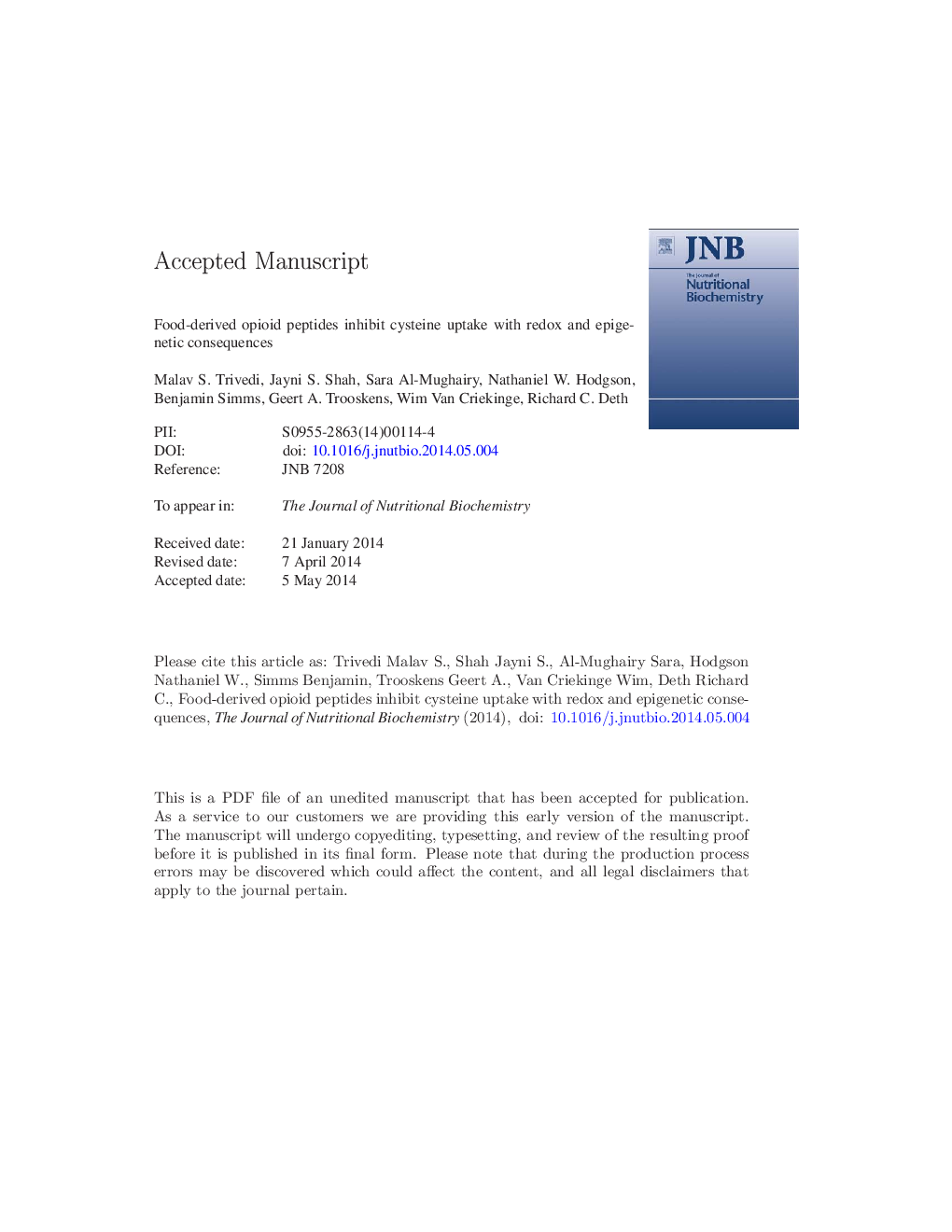| کد مقاله | کد نشریه | سال انتشار | مقاله انگلیسی | نسخه تمام متن |
|---|---|---|---|---|
| 8337101 | 1540656 | 2014 | 29 صفحه PDF | دانلود رایگان |
عنوان انگلیسی مقاله ISI
Food-derived opioid peptides inhibit cysteine uptake with redox and epigenetic consequences
ترجمه فارسی عنوان
پپتیدهای اپیوئید حاصل از غذا با جذب سیستئین با عوارض اکسیژن و ردوکسها، مانع از جذب سیستئین می شوند
دانلود مقاله + سفارش ترجمه
دانلود مقاله ISI انگلیسی
رایگان برای ایرانیان
کلمات کلیدی
گلوتاتیون، کازامورفین، گلیادین، اختلال طیف اوتیسم، جنون جوانی، بیماری سلیاک، رژیم غذایی بدون گلوئون / بدون کازئین،
موضوعات مرتبط
علوم زیستی و بیوفناوری
بیوشیمی، ژنتیک و زیست شناسی مولکولی
زیست شیمی
چکیده انگلیسی
Dietary interventions like gluten-free and casein-free diets have been reported to improve intestinal, autoimmune and neurological symptoms in patients with a variety of conditions; however, the underlying mechanism of benefit for such diets remains unclear. Epigenetic programming, including CpG methylation and histone modifications, occurring during early postnatal development can influence the risk of disease in later life, and such programming may be modulated by nutritional factors such as milk and wheat, especially during the transition from a solely milk-based diet to one that includes other forms of nutrition. The hydrolytic digestion of casein (a major milk protein) and gliadin (a wheat-derived protein) releases peptides with opioid activity, and in the present study, we demonstrate that these food-derived proline-rich opioid peptides modulate cysteine uptake in cultured human neuronal and gastrointestinal (GI) epithelial cells via activation of opioid receptors. Decreases in cysteine uptake were associated with changes in the intracellular antioxidant glutathione and the methyl donor S-adenosylmethionine. Bovine and human casein-derived opioid peptides increased genome-wide DNA methylation in the transcription start site region with a potency order similar to their inhibition of cysteine uptake. Altered expression of genes involved in redox and methylation homeostasis was also observed. These results illustrate the potential of milk- and wheat-derived peptides to exert antioxidant and epigenetic changes that may be particularly important during the postnatal transition from placental to GI nutrition. Differences between peptides derived from human and bovine milk may contribute to developmental differences between breastfed and formula-fed infants. Restricted antioxidant capacity, caused by wheat- and milk-derived opioid peptides, may predispose susceptible individuals to inflammation and systemic oxidation, partly explaining the benefits of gluten-free or casein-free diets.
ناشر
Database: Elsevier - ScienceDirect (ساینس دایرکت)
Journal: The Journal of Nutritional Biochemistry - Volume 25, Issue 10, October 2014, Pages 1011-1018
Journal: The Journal of Nutritional Biochemistry - Volume 25, Issue 10, October 2014, Pages 1011-1018
نویسندگان
Malav S. Trivedi, Jayni S. Shah, Sara Al-Mughairy, Nathaniel W. Hodgson, Benjamin Simms, Geert A. Trooskens, Wim Van Criekinge, Richard C. Deth,
